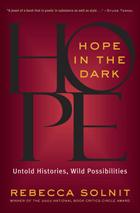Say one thing about the world of sports: in some fashion, it invariably reflects developments in the larger world. It hardly matters whether the subject is war or inequality. Take a knee for a moment and think about that or, in the age of Donald Trump, think about the president whose bone spur problems have never stopped him from cheating at golf or promoting his golf clubs while in the White House -- or, in fact, spending the odd day in the White House while he was promoting (and staying at) those golf clubs (and getting ferried from one “lock-her-up” rally to the next to denounce anyone on this planet taking a knee about more or less anything).
If only we could say goodbye to all that! Fortunately, we have TomDispatch’s jock culture correspondent (and former New York Times sports reporter and columnist) Robert Lipsyte who knows a thing or two about both sports and saying goodbye to all that. Since, in this ever-changing age of ours, there can be little question that, with the help of a group of Washington "terrarists" -- no, that's not a misspelling -- including The Donald, we are heading for a goodbye-to-all-that future, it’s none too soon to consider what Lipsyte calls the Jockpocalypse version of the same. Tom
Jockpocalypse
From the Ballpark to Team Trump
By Robert LipsyteA half-century ago, the sporting Cassandras predicted that the worst values and sensibilities of our increasingly corrupted civic society would eventually affect our sacred games: football would become a gladiatorial meat market, basketball a model of racism, college sports a paradigm of commercialization, and Olympic sports like swimming and gymnastics a hotbed of sexual predators.
Mission accomplished!
The Cassandras then forecast an even more perverse reversal: our games, now profaned, would further corrupt our civic life; winning would not be enough without domination; cheating would be justified as gamesmanship; extreme fandom would become violent tribalism; team loyalty would displace moral courage; and obedience to the coach would supplant democracy.
Okay, I think it’s time for a round of applause for those seers. Let’s hear it for Team Trump!
Even as those predictions were coming true over the past two years, as a longtime sports reporter, columnist, TV commentator, and jock culture correspondent for TomDispatch, I waited with a certain dread and expectation for the arrival of the true Jockpocalypse, the prophetic revelation that Jock Culture had indeed become The Culture. There would be three clear signs, I thought, of this American sports version of a biblical Armageddon.
I remember well the antiwar movement of the Vietnam era. I was in it and it was distinctly in the streets, big time. I was typical, for instance, in traveling to Washington in October 1967 for a march on the Pentagon, which proved to be the largest antiwar protest ever staged to that point -- a crowd so vast I had never seen the likes of it before. And I returned to the capital a year or two later for a far more chaotic antiwar demonstration in which I remember having to choose between staying with a bold friend eager to rush further into the tear-gas-laced streets around the Washington Mall or run for it -- alone. (I reluctantly chose to stay.) And then there were all the little moments of work and opposition over so many years, the moments when you weren’t with crowds of people in those streets, but you were still focused on opposing that American war from hell.
And then, of course, I remember that second antiwar moment of vast crowds on a global scale in the winter and early spring of 2003, when I found myself once again marching with staggering numbers of other people against a grim American war, this time one still to come. It was already obvious, though, that the top officials of the Bush administration were intent on invading Saddam Hussein’s Iraq, no matter what. Still, I suspect the crowds of demonstrators then put even the Vietnam protests to shame. Strangely, however, when that war began and essentially didn’t end but spread, when it came to embroil, in one way or another, much of the Greater Middle East and then parts of Africa, when the Arab Spring broke out, Syria cracked open, and ISIS appeared -- when, to use a phrase of former Arab League head Amr Mussa, it was clearer that we had passed through “the gates of Hell” in the Greater Middle East -- it seemed as if no one in the U.S. was in the streets or anywhere else.
Yes, there were some places like TomDispatch that continued to focus on those never-ending wars and the chaos, death, displacement, and destruction they caused, but generally it felt -- at least to me -- as if, in a period of never-ending and disastrous conflicts across vast (and distant) stretches of the planet, the American public was nowhere to be found. That’s why, when I read TomDispatch regular Allegra Harpootlian’s take on the situation, I found a certain genuine hope there. No, there still isn’t an antiwar movement in the streets of America, but that doesn’t mean nothing is happening, nothing is forming, nothing is brewing when it comes to our twenty-first-century wars from hell, not if you look in the right way and in the right places. Check out her piece and see what I mean. Tom
The Antiwar Movement No One Can See
Will It Put a Crimp in the War on Terror?
By Allegra HarpootlianWhen Donald Trump entered the Oval Office in January 2017, Americans took to the streets all across the country to protest their instantly endangered rights. Conspicuously absent from the newfound civic engagement, despite more than a decade and a half of this country’s fruitless, destructive wars across the Greater Middle East and northern Africa, was antiwar sentiment, much less an actual movement.
Those like me working against America’s seemingly endless wars wondered why the subject merited so little discussion, attention, or protest. Was it because the still-spreading war on terror remained shrouded in government secrecy? Was the lack of media coverage about what America was doing overseas to blame? Or was it simply that most Americans didn’t care about what was happening past the water’s edge? If you had asked me two years ago, I would have chosen “all of the above.” Now, I’m not so sure.
Yes, they’re now known as the “greatest generation,” while the generation that followed them is sometimes referred to as the “silent” one. In my own limited experience, however, those World War II vets, the ones I knew anyway, were remarkably silent about their wartime lives. My dad was one of them. Yes, he got angry at me when I went in on a half share of a used Volkswagen Beetle with a college friend. (It was German!) Yes, he refused to go to the single Japanese restaurant then in our neighborhood in New York City. (He had been operations officer for the First Air Commandos in Burma, fighting the Japanese!) Yes, he got mad if my mother or I went into the little grocery store on our block and bought anything. (They had, he insisted, been profiteers during the war!) But the war itself, his personal war, wasn’t a matter of open pride or stories told to his son. It was largely missing in action. Though he certainly sat through World War II movies with me when I was a boy, he never commented on them. (Since he said nothing, I assumed that the Hollywood heroics were the real thing.) As for that duffle bag in his closet with old documents, his mess kit, his dog tags, and other war memorabilia, he almost never opened it. Like many in that war generation, I suspect, he considered his experience (and himself) anything but “the greatest.”
The recent D-Day celebrations -- and today’s piece about them by TomDispatch regular Andrew Bacevich, whose new book, The Age of Illusions: How America Squandered Its Cold War Victory, will be a must-read when it’s published in January -- brought all this back to me so many decades after my father’s death. But I must admit that another set of thoughts came to mind as well. After all, one of this country’s most prominent former generals, David Petraeus, has called the still-spreading war on terror a “generational struggle.” At this moment, when some of the first babies born after the 9/11 attacks may already be heading for Afghanistan and our other war zones as 17-year-old members of the all-volunteer armed forces, one thing is certain: decades from now we won’t be celebrating the (briefly) triumphant invasion of Afghanistan in October 2001 or the entry of American forces into Baghdad in April 2003 with moving ceremonies attended by global leaders of (almost) every sort.
We’re a couple of generations into Washington’s latest wars and yet it’s hard to imagine what monikers those generations might someday be given. Obviously not “the greatest” -- not when so many years of war have, unlike in World War II, produced not a single bona fide victory. Of course, it’s not up to me, but one that comes to my mind might be “the forgotten generation,” because most of the time the wars they’ve fought in are largely forgotten or ignored here, even as they continue. In some sense, they might as well not have happened, never-ending as they are, and yet, of course, they’ve helped unsettle the planet, created refugees by the millions (reinforcing the populist right in Europe and this country), and spread terror groups far and wide. Or perhaps the post-9/11 volunteers among them should be called “the missing generation” since, at least in this country, their wars, and so their experiences remain essentially missing in action even as they continue. While you read Bacevich’s latest post on D-Day and the misuse of history give a thought to those still unnamed generations of soldiers and wonder why their wars never end. Tom
The Art of Shaping Memory
Knowing Whom to Remember and How to Forget
By Andrew J. BacevichHow best to describe the recently completed allied commemoration of the 75th anniversary of the D-Day invasion of France? Two words come immediately to mind: heartfelt and poignant. The aged D-Day veterans gathering for what was probably the last time richly deserved every bit of praise bestowed on them. Yet one particular refrain that has become commonplace in this age of Donald Trump was absent from the proceedings. I’m referring to “fake news.” In a curious collaboration, Trump and the media, their normal relationship one of mutual loathing, combined forces to falsify the history of World War II. Allow me to explain.
In early October 2016, as the most staggering presidential election campaign of our lives was nearing its end, I wrote this about the man whom, I suggested, heartland working-class whites might consider dispatching to the White House as an American version of a “suicide bomber”:
“In relation to his Republican rivals, and now Hillary Clinton, he stands alone in accepting and highlighting what increasing numbers of Americans, especially white Americans, have evidently come to feel: that this country is in decline, its greatness a thing of the past, or as pollsters like to put it, that America is no longer ‘heading in the right direction’ but is now ‘on the wrong track.’ In this way, he has mainlined into a deep, economically induced mindset, especially among white working-class men facing a situation in which so many good jobs have headed elsewhere that the world has turned sour.
“Or think of it another way (and it may be the newest way of all): a significant part of the white working class, at least, feels as if, whether economically or psychologically, its back is up against the wall and there’s nowhere left to go. Under such circumstances, many of these voters have evidently decided that they’re ready to send a literal loose cannon into the White House; they’re willing, that is, to take a chance on the roof collapsing, even if it collapses on them.”
And I wouldn’t take back a word of that, not in a country in which you can indeed feel a sense of decline still growing, in which, as TomDispatch regular Rajan Menon has recently made clear, epidemics of self-disrespect, self-loathing, and self-harm are distinctly the order of the day. And speaking, in fact, of suicide and presidents, as Menon makes strikingly evident today, in that very same heartland, among that very same white working class, suicide itself is rising to epidemic proportions and the suicide bomber in the White House is giving it quite a helping hand. Tom
America’s Suicide Epidemic
It’s Hitting Trump’s Base Hard
By Rajan MenonWe hear a lot about suicide when celebrities like Anthony Bourdain and Kate Spade die by their own hand. Otherwise, it seldom makes the headlines. That’s odd given the magnitude of the problem.
In 2017, 47,173 Americans killed themselves. In that single year, in other words, the suicide count was nearly seven times greater than the number of American soldiers killed in the Afghanistan and Iraq wars between 2001 and 2018.
If Donald Trump Is the Symptom...
Then What’s the Disease?
By Tom Engelhardt
Don’t try to deny it! The political temperature of this country is rising fast. Call it Trump change or Trump warming, if you want, but grasp one thing: increasingly, you’re in a different land and, whatever happens to Donald Trump, the results down the line are likely to be ever less pretty. Trump change isn't just an American phenomenon, it's distinctly global. After all, from Australia to India, the Philippines to Hungary, Donald Trumps and their supporters keep getting elected or reelected and, according to a recent CNN poll, a majority of Americans think Trump himself will win again in 2020 (though, at the moment, battleground-state polls look grim for him).
Still, whether or not he gets a second term in the White House, he only seems like the problem, partially because no president, no politician, no one in history has ever gotten such 24/7 media coverage of every twitch, tweet, bizarre statement, falsehood, or fantasy he expresses (or even the clothes he wears). Think of it this way: we’re in a moment in which the only thing the media can’t imagine saying about Donald Trump is: “You’re fired!” And believe me, that’s just one sign of a media -- and a country -- with a temperature that’s anything but 98.6.
Since you-know-who is always there, always being discussed, always @(un)realdonaldtrump, it’s easy enough to imagine that everything that’s going wrong -- or, if you happen to be part of his famed base, right (even if that right isn’t so damned hot for you) -- is due to him. When we’re gripped by such thinking and the temperature’s rising, it hardly matters that just about everything he’s “done” actually preceded him. That includes favoring the 1%, deporting record numbers of illegal immigrants, and making war (unsuccessfully) or threatening to do so across significant parts of the planet.
Here, then, is the question of the day, the sort you’d ask about any patient with a rising temperature: If Donald Trump is only the symptom, what’s the disease?





















